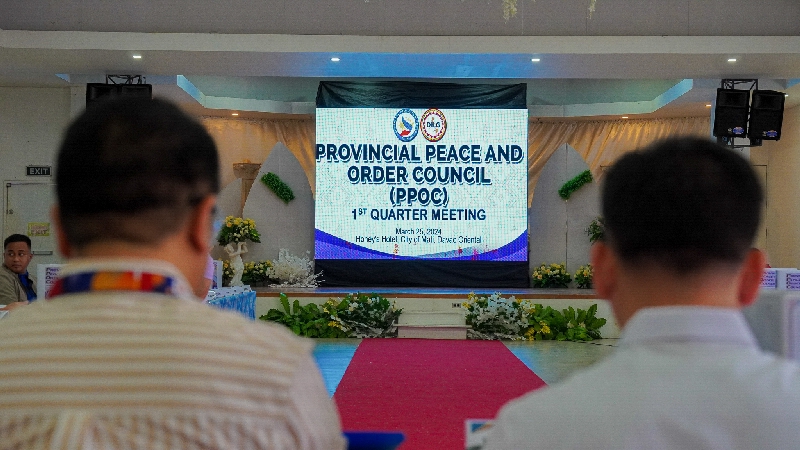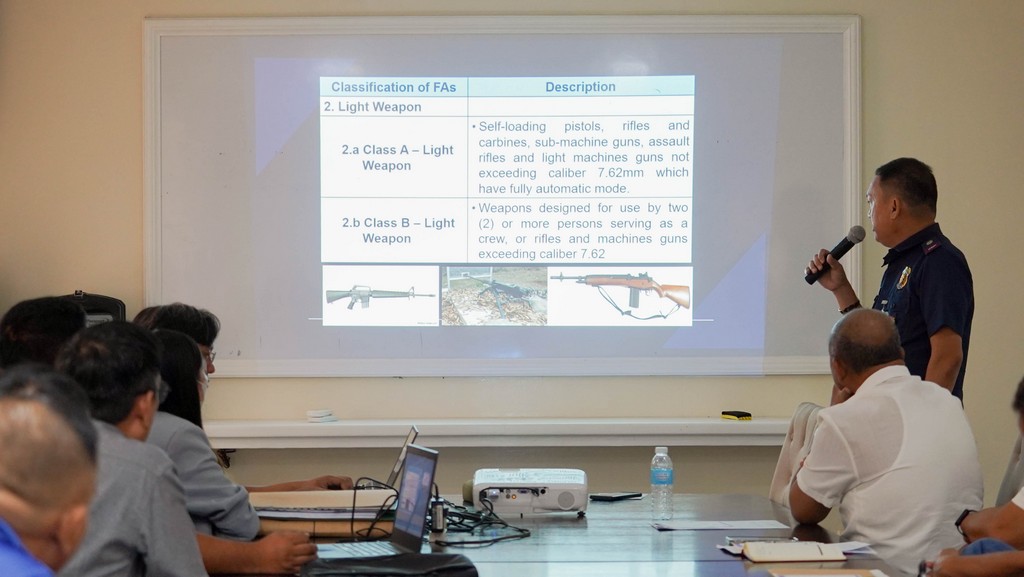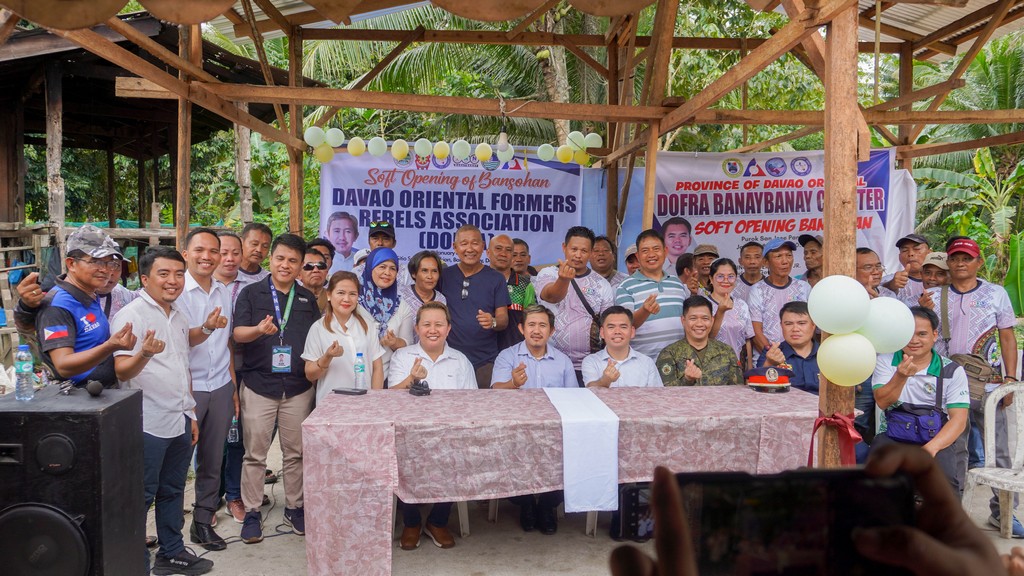“Beautiful Davao Oriental is now insurgency-free!” exclaimed the new chief executive of Davao Oriental, Corazon Malanyaon, in a grandiose ceremony graced no less by the country’s secretary of national defense, Jose Faustino Jr. and three other provincial governors of the Davao Region.
“The road to peace is the road itself. Let us sustain the gains, and together, we develop as one Davao Region,” says the ecstatic Governor Malanyaon clad in a white-pink gorgeous dress.
The historic event was also witnessed by hundreds of former Communist insurgents who now form a highly dynamic communities of “peace warriors” across the province as they enjoy the many economic benefits being offered to them by the government in exchange for dropping their decades-old armed struggle that never know when to stop.

“Back then, many tourists would want to come to our province and there were dozens of investors who wished to put up a business in the province. But always, when they asked about our peace and order situation, no one would assure them with confidence that they will be safe in Davao Oriental because we knew then the threats of insurgency looms. Today’s declaration of the province as insurgency-free is a defining moment for Davao Oriental. A milestone in our journey towards achieving peace,” says the governor who made a historic comeback this year to the Capitol after finishing a nine-year term as the province’s chief executive. She ran unopposed in this year’s polls.
The declaration of “insurgency-free” status of Davao Oriental along with four other provinces in the Davao region is historic as it is the first of its kind after the government military effectively dealt a fatal blow to the last standing guerilla fronts in the province.

For decades, the Communist New People’s Army rebels established bailiwicks in the Davao Region.
During the heydays of the Communist insurgency in the 1980s, many communities in Davao Oriental were deemed as the “killing fields,” costing the lives of so many innocent people, mostly highly marginalized who lived in geographically isolated and disadvantaged communities that once served as fertile breeding grounds for the heavily armed insurgents who took advantage of the government’s neglect to these communities.
The governor said the peace and development efforts of the provincial government and the military being strengthened through the years has led to the achievement of remarkable results that includes the mass surrender of rebels and members of its underground mass organizations who have chosen to live the life of peace.

She said that like her predecessor, former governor now congressman, Nelson Dayanghirang, she would always prioritize peace and order in her development agenda as she believe that the struggle for peace is not won through violence but in the ability of the government to touch the hearts and minds of the people.
“It is worth remembering that in 2013, during the inauguration of our Happy Home (for the surrendering rebels), we were declared as development-ready. But history tells us that the peace that we had achieved was temporary. The insurgency emerged again in late 2016, this time from a reduced number, they consolidated because ceasefire was declared. However, everything collapsed. With the culmination of the peace talks in February 2017, the 10th Infantry Division relaunched a new campaign strategy. It is called the Community Support Program. The creation of the NTF-ELCAC complemented and give flesh to the government’s anti-insurgency program,” said the governor.
A new battle against complacency and inaction

The secretary of the Department of National Defense Jose Faustino Jr said that after defeating the decades-old Communist insurgency in the region, the people must brace for a new different fight.
“Today, marks the end of our fight. But today also marks the beginning of a new battle against complacency and inaction. Having planted the seeds of peace and development in your communities, we must carefully foster and sustain them so that they may mature into solid and resilient trees that epitomize our nation’s worthy aspirations and dignified heritage,” says the Defense secretary.

Faustino also thanked the huge support of local government officials and civilian partners, “for without them, our efforts would be limited. They made our projects strategic, impactful and meaningful to the communities.”
“I remember during the first days of our peace and development initiatives, skepticism appears to be the norm in those days. The common questions are, makaya ba jud wad-on ang insurhensiya? Makaya ba jud nato nga mapanaog ang mga rebelde? (Can we really solve the insurgency? Can we really make the rebels to go back to the fold of law?) I must admit that these are difficult questions to answer in those days. But we persevered, we marched on despite the challenges. And look, where Davao Oriental is now? We stood up and fought through thick and thin. Together with the people, we stood up and fought through thick and thin. We reached out to various communities,” said Faustino.

“Our local history is replete with struggles for the realization of our people’s worthy aspirations. Stories of heroism would tell us that freedom is not a thing handed on a silver platter. Instead, it is something that we as a people have to earn for ourselves, with our sweat, tears and even blood if need be. Today, the people of Davao Oriental firmly and openly assert their right to live free from the threats of the Communist terrorist group. Free to work peacefully and go about their days with hearts unburdened by the terror of uncertain tomorrow,” the Defense secretary said.
“The time is ripe for the local government to double down on initiatives to strategically attract suitable investments for the benefit of everyone. I encourage you to support the well-meaning endeavors of your local leaders. It is only with your support that they can serve you well. Davao Oriental, with its gracious people and rich natural resources, deserve the best,” Faustino said.
However, for Major General Nolasco Mempin, commander of the Philippine Army’s 10th Infantry Division, the “victorious celebration of peace” in Davao Oriental is the “most precious gift” to its people in the coming yuletide season.

For former Davao Oriental governor, now First District Rep. Nelson Dayanghirang, the armed conflict can be resolved by building mutual trust and understanding. He asked his constituents to continue to strive to firmly install the pillars of shared peace and prosperity in Davao Oriental. He urged his constituents to make a strong commitment to the goal of peace as the people are earnestly longing for an end to violent conflict. He said that community dialogue must be fostered to create many more communities of peace. Rep. Dayanghirang said that in planting the seeds of trust and unity, the people are now starting to reap the the fruits of peace. “This is our way of uniting the people into a common vision and a common spirit of love, unity and understanding which is the key element of peace. We bring peace and we bring development to our people,” said Rep. Dayanghirang.
For the millennial lawmaker, Davao Oriental Second District Rep. Cheeno Miguel Almario, peace is a “very interesting thing.”
“As a millennial, I personally have not experienced the terrors of insurgency. But I found out that peace is a very interesting thing. For our men and women in uniform, the purpose of war is for peace. At the same time, in times of peace, we prepare for war. And it is a never-ending cycle. However, once we achieve that peace, like what we have done today, we as the millennials should be able to stand up and cherish the peace that we are given through the blood and sweat, tears and lives of the people who served our country. As a millennial, to enjoy the peace that we did not directly work for, we ought to reciprocate and to complement the efforts of the men and women in uniform by making the most out of it,” said Rep. Almario. PIO | Photos by Mark Oliver Alvite




